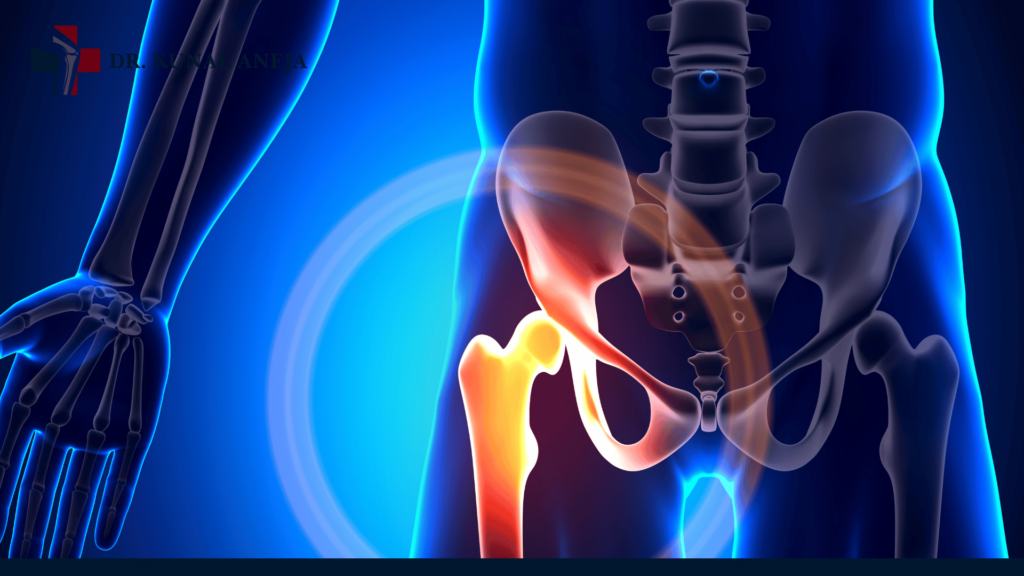Overview
Imagine this: A 52-year-old father of two, once active and energetic, now finds it challenging to walk his dog or even climb a flight of stairs. The constant hip pain has drained his zest for life. For people like him, hip replacement surgery can be the answer to restoring their movement and independence. If you or a loved one are facing similar struggles, you may be wondering whether hip replacement surgery is the right option and, more importantly, how to find the best Hip Replacement Surgeon in Delhi. In this article, we’ll take a deep dive into the world of hip replacement surgery, guide you through the process of choosing the best surgeon, and introduce you to Dr. Kunal Aneja, a name synonymous with excellence in orthopaedic care.

What is Hip Replacement Surgery and When is it Recommended for Patients?
- Hip replacement surgery is a procedure where a damaged or worn-out hip joint is replaced with an artificial implant, allowing for smoother movement and pain relief.
- It’s often recommended for patients with severe arthritis, trauma, or other degenerative hip conditions that haven’t responded to conservative treatments like physical therapy or medications.
- Common candidates include those with osteoarthritis, rheumatoid arthritis, avascular necrosis, and individuals who’ve sustained a serious hip injury.
How Does Hip Pain Impact Daily Life, and Can Hip Replacement Surgery Offer Relief?
- Persistent hip pain can drastically limit your day-to-day activities, from walking to sitting comfortably.
- The discomfort may lead to sleep disturbances, emotional stress, and a decline in the overall quality of life.
- Hip replacement surgery offers relief by removing the damaged joint, eliminating pain, and improving mobility, allowing patients to return to a pain-free, active lifestyle.
How Do You Find the Best Hip Replacement Surgeon in Delhi for Your Surgery?
Choosing the right Hip Replacement Surgeon in Delhi can be daunting, but here’s what you should look for:
- Experience and specialization: Surgeons like Dr. Kunal Aneja, who is a triple board-certified orthopaedic surgeon with fellowship training in hip replacement, offer the highest level of expertise.
- Patient reviews: Positive feedback from past patients gives insight into a surgeon’s skill and care.
- Advanced techniques: Surgeons trained in robotic or navigation-assisted surgery often provide better outcomes with more precision and faster recovery times.

What Should You Expect Before, During, and After Hip Replacement Surgery?
Pre-Surgery:
- You’ll undergo medical evaluations, including blood tests and imaging, to ensure you’re fit for surgery.
- Your surgeon will discuss risks, benefits, and what to expect, as well as pre-surgery preparation such as exercises and dietary adjustments.
During Surgery:
- The procedure typically lasts 1-2 hours and is performed under general or spinal anesthesia.
- The damaged hip joint is removed and replaced with a prosthetic implant.
Post-Surgery:
- Expect to stay in the hospital for 1-3 days.
- A physical therapy regimen will be prescribed to help regain strength and mobility.
What are the Risks and Success Rates Associated with Hip Replacement Surgery?
- While hip replacement surgery has a high success rate (around 90-95%), every surgery carries risks.
- Common risks include infection, blood clots, implant dislocation, and in rare cases, nerve damage.
- However, with an experienced surgeon like Dr. Kunal Aneja, the likelihood of complications is greatly minimized due to his expertise in minimally invasive techniques.
What Questions Should You Ask Your Surgeon Before Hip Replacement Surgery?
To ensure you’re making the best decision for your health, ask these critical questions:
- What is your experience with hip replacement surgeries?
- What type of prosthetic implant will be used?
- How long will the recovery process take?
- What precautions should I take before and after surgery?
- What are the potential risks and complications, and how do you mitigate them?
How Long is the Recovery Process After Hip Replacement Surgery, and What Can You Do to Speed It Up?
- The typical recovery time ranges from 6 weeks to 6 months, depending on factors like your age, health, and the complexity of your surgery.
Tips for a Faster Recovery:
- Follow your physical therapy program diligently.
- Stay active but avoid overexertion—walking and light exercises are essential.
- Eat a balanced diet rich in vitamins and proteins to promote healing.
- Avoid smoking and excessive alcohol as they can delay recovery.
- Use assistive devices like crutches or walkers initially, as recommended by your doctor.
Why Dr. Kunal Aneja is the Best Hip Replacement Surgeon in Delhi
If you’re seeking the best hip replacement surgeon in Delhi, look no further than Dr. Kunal Aneja. With extensive training across leading medical institutions worldwide, Dr. Aneja specializes in robotic and minimally invasive joint replacement techniques. His dedication to patient care and his ability to leverage cutting-edge technology makes him the go-to surgeon for anyone seeking expert hip replacement surgery. Dr. Aneja’s motto, “Life is movement, Movement is Life,” reflects his commitment to restoring quality of life to his patients.

Conclusion
When hip pain starts dictating your everyday activities, it’s time to take action. A well-executed hip replacement surgery can give you back the freedom to move without discomfort. If you’re looking for the best hip replacement surgeon in Delhi, Dr. Kunal Aneja stands out due to his extensive experience, advanced techniques, and personalized care. With his guidance, you can be assured of a safe and successful journey towards pain-free living.
FAQs
1. How long does a hip replacement surgery take?
Ans. A typical hip replacement surgery lasts about 1-2 hours, depending on the complexity of the case.
2. What is the life expectancy of a hip implant?
Ans. Most hip implants last between 15 to 20 years, but some can last longer with proper care.
3. Is hip replacement surgery painful?
Ans. You may experience discomfort after the procedure, but your surgeon will manage it with pain medications and physical therapy.
4. Can I engage in sports after a hip replacement?
Ans. Yes, low-impact sports like swimming or cycling are encouraged after full recovery, typically within 6 months.
5. When can I return to work after hip replacement surgery?
Ans. Most patients can return to work within 4 to 6 weeks, depending on the physical demands of their job.

